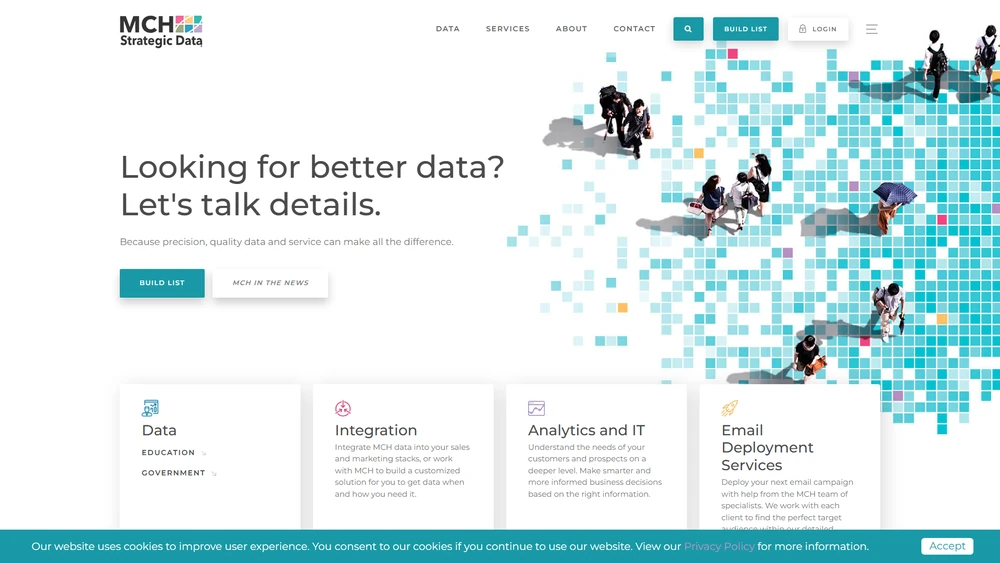MCH Strategic Data Overview & 2025 Industry Position
MCH Strategic Data is a leading provider of compiled data and marketing intelligence that focuses on institutions such as schools, hospitals, and local governments. In 2025, as data-driven decision-making redefines outreach and public engagement, MCH Strategic Data offers hyper-targeted datasets to support marketing, development, recruitment, and research campaigns. The company’s long-standing expertise in structured data curation makes it an indispensable partner for organizations that rely on up-to-date, granular intelligence.
Built on a legacy of credibility and consistency, the company has expanded its platform to accommodate digital-first tools and integrations while staying rooted in its foundational categories: education, healthcare, and government data.
From Launch to 2025: MCH Strategic Data’s Journey
Originally founded in 1928, MCH Strategic Data began as a direct mail services company. Over the decades, it strategically transitioned to focus on educational data in the 1980s, later expanding into healthcare and government datasets. In 2002, the company pioneered online access to education institution data. By 2015, APIs and SaaS-based delivery became integral parts of its roadmap. In 2020, MCH Strategic Data responded to COVID-19 with real-time school opening data, enhancing its reputation as a reliable data source during crises. As of 2025, the company aims to lead the transformation of community-centered intelligence, offering more predictive analytics and customizable segmenting capabilities for institutions and commercial clients alike.

MCH Strategic Data Key Features
MCH Strategic Data offers several product categories that empower marketers, researchers, and institutions to make meaningful decisions:
- Education Data Intelligence: Access to over 5 million teachers and 130,000 schools, including private and public institutions.
- Healthcare Market Profiles: Coverage of hospitals, clinics, and physician practices with verified contact data.
- Government Entity Reach: Data on local government officials, public procurement contacts, and operational budgets.
- Geo-Targeted Filters: Tools allowing segmentation by zip code, school district, or political boundary.
- Delivery APIs: Seamless real-time data pulls into CRMs or analytics platforms.
- Email Campaign Access: Prebuilt list segmentation with deliverability optimization.
Workflow & UX
Users access MCH Strategic Data through a secure online portal or integrate it into their operational software via API. The interface is logically arranged around use-case flows — whether building a lead list or exporting data for direct mail campaigns. Navigation is intuitive, with left-hand panel filtering and export guidance streamlined to get key lists out in under three clicks. The company offers onboarding tools and tutorials for new clients, making adoption smooth even for entry-level marketers or researchers.
Pro Tip: Use the “Data Enhancer” widget to layer geographic and demographic filters for sharper micro-targeting results.
MCH Strategic Data Pricing Analysis & Value Metrics
As of July 2025, pricing is structured around data category, usage volume, and delivery method. Here is a sampling of current plans:
| Plan | Includes | Pricing (Monthly) |
|---|---|---|
| Starter | Up to 5K contacts, 1 category, CSV download | $149 |
| Professional | 25K contacts, 3 categories, API access | $499 |
| Enterprise | Custom volume, all categories, CRM integrations | Quote-based |
Value is strongest for mid-size teams seeking dependable outreach targets in education and government sectors. The APIs and integrations justify the Professional and Enterprise pricing tiers.
Competitive Landscape
MCH Strategic Data competes with providers like Dun & Bradstreet, Market Data Retrieval, and Data Axle, but its institutional specialization makes it stand out. Here’s how it compares:
| Brand | Core Focus | Best For | 2025 Pricing |
|---|---|---|---|
| MCH Strategic Data | Education, Healthcare, Government | Community-focused campaigns | $149–$499/mo |
| Dun & Bradstreet | Business credit, enterprise B2B | Financial vetting | $399–$800/mo |
| Data Axle | Consumer & SMB data | Retail and local advertisers | $79–$499/mo |
Use Cases
- K–12 curriculum vendors targeting district administrators
- Healthcare software companies reaching rural clinics
- Political campaigners segmenting municipal leaders by policy issue
- Nonprofits soliciting school-based partnerships for community programs
Integrations Ecosystem
MCH Strategic Data offers flexible API integrations with leading platforms such as:
- Salesforce and HubSpot (CRM)
- Mailchimp and Constant Contact (Email)
- Snowflake and Tableau (Data/BI)
- Quickbase and Airtable (Ops)
This connectivity streamlines workflows across marketing, development, and data teams.
Pros and Cons
- Pros:
- Granular institutional data unmatched in education and healthcare
- Intuitive filtering and campaign-ready lists
- Recent API improvements allow real-time sync
- Cons:
- Pricing jump between Starter and Pro tiers
- Limited international data scope
- User interface favors desktop over mobile
Final Thoughts
MCH Strategic Data is best suited for education marketers, research analysts, and community-engagement stakeholders who need up-to-date, targeted institution-level data in the U.S. While more expensive than generic list providers, the platform’s filtering depth and accuracy set it apart for 2025 users demanding precision. If you’re running outreach into public hospitals, school districts, or local municipalities, MCH Strategic Data operations makes the case for itself through data depth alone.
MCH Strategic Data FAQ
The platform specializes in education (K–12), healthcare (hospitals and clinics), and public/government institutions in the U.S.
Yes. API access is available for Professional and Enterprise tiers, enabling real-time data connections.
Yes. They provide email lists with opt-in segments for contact-level communication compliant with federal regulations.
No. MCH Strategic Data currently focuses exclusively on United States institutions.
Absolutely. Users can filter by school district, funding level, geographic zip, and more for ultra-targeted lists.